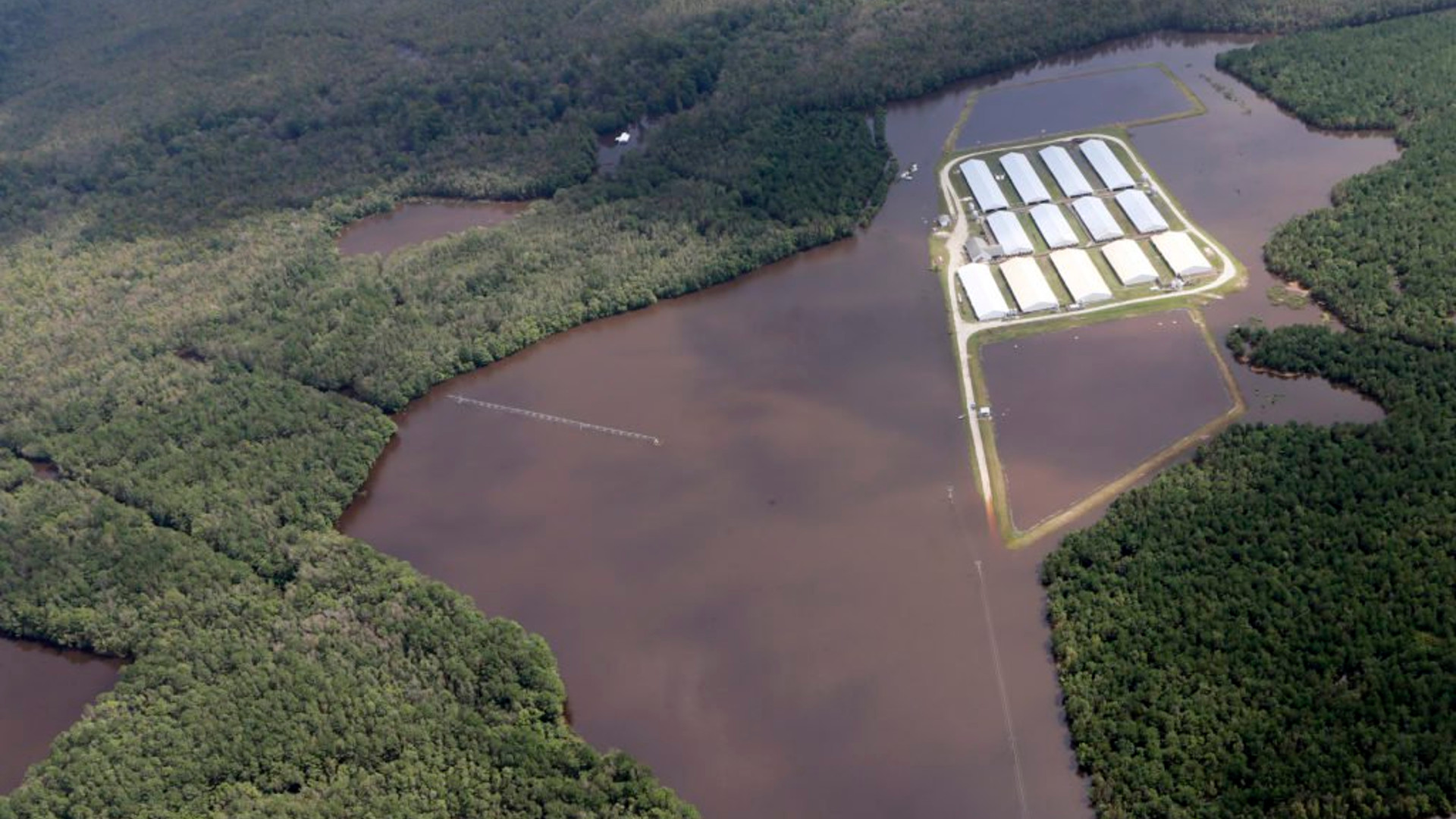When Hurricane Florence descended on North Carolina last month, it left a devastating flood of farm-animal feces in its wake.
The waste leaked from manure “lagoons” located on massive livestock farms called “confined animal feeding operations,” often known as CAFOs. Dozens of these manure lagoons — pits of pig waste mixed with water and slowly broken down by anaerobic bacteria — were breached or compromised during the storm, sending millions of gallons of effluent into nearby tributaries and rivers.
It wasn’t the first time, and it’s not a small problem. North Carolina’s CAFOs hold nearly 10 million pigs, who defecate an estimated 10 billion gallons of manure every year. For years experts have warned that the waste lagoons collecting and treating all of this manure, many of which are located in flood-prone areas, are prone to leakage — just as we saw during Florence and 2016’s Hurricane Matthew.
Even living near these sites under “normal” weather conditions has been linked to a long list of dangerous health effects, including a lowered life expectancy, according to a study published just days before Hurricane Florence.
Addressing this situation — especially in the face of increasingly powerful storms driven by climate change — won’t be easy.
“The problem needs action on various levels,” says Karen Perry Stillerman, a senior analyst with the food and environment program of the Union of Concerned Scientists. “North Carolina and other states must do more to regulate the size of CAFOs and waste lagoons and the hazards they pose to people nearby.”
Some other states are starting to take action on this. Missouri recently passed a health ordinance to regulate emissions from CAFOs, and some Iowa residents are suing to better enforce or tighten rules that govern harmful air pollution from nearby hog CAFOs.
But can states or state citizens do enough on their own? North Carolina acknowledged problems with the current lagoon and “sprayfield” system more than two decades ago, but the awful conditions persist, says Will Hendrick, a staff attorney at Waterkeeper Alliance. The state does require many producers use newer technologies to eliminate their waste, which Hendrick says “have been proven effective,” but big producers like the ones whose lagoons flooded have long been exempt from those rules. He says it’s time to “take the long-overdue step of requiring giant companies like Smithfield Foods to invest in superior waste management to manage the waste generated by the hogs it owns, which constitute more than three-quarters of those produced in North Carolina.”
That might require action above the state level. “The federal government must help by disincentivizing this model of livestock production,” says Perry Stillerman. “The five-year federal farm bill should offer more technical and financial support for farmers to raise animals in safe, sustainable ways, and it shouldn’t subsidize CAFO waste storage and disposal.” A recent blog post by Perry Stillerman points out that CAFO operators received $113 million in the 2017 fiscal year for “funding improvements to waste storage facilities and subsidizing manure transfer costs” — an amount that could actually go up if the current version of the farm bill passes. The bill would also eliminate a program that provides incentives for sustainable livestock practices.
The federal government, meanwhile, is partnering with North Carolina in another way. Since the year 2000 the state has offered payments to pork producers located in floodplains to shift to other types of agriculture, or to purchase conservation easements. The most recent round of buyouts, conducted in partnership with the USDA, cost taxpayers $18.7 million. So far 42 producers, including 34 that probably would have flooded this past month, have participated in the program, and applications are currently open for the next buyouts.
That’s not the only solution on the table. Perry Stillerman adds that consumers also have a role in ending this problem by changing what’s on their dinner tables. “CAFOs happen because there’s a demand for large quantities of inexpensive meat,” she says. “Eating less meat, and spending your dollars on sustainably raised meat, will help farmers move away from CAFOs and the problems they cause.”
If we don’t take action individually and as a country, Perry Stillerman says, CAFOs will remain at risk of devastating events like these, most notably in the floodplains of southeastern North Carolina — “and especially in a future that science tells us will bring more intense, more destructive hurricanes and other large rain events that cause flooding.”
North Carolina appears to have escaped a replay of this problem following last week’s Tropical Storm Michael, although that storm did cause severe flooding throughout the state. What the next storms will bring, and which CAFO manure lagoons might be affected, remains to be seen.
Previously in The Revelator:
Wasted Water: The Crappiest Places in America — Literally


